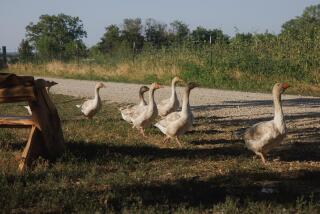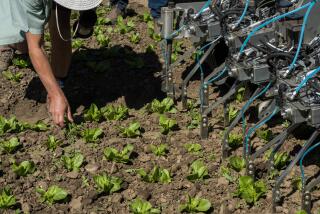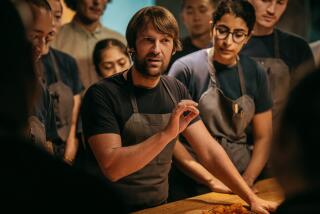COLUMN ONE : One Step Beyond Organic : Biodynamic farmers don’t just grow things naturally. They dig metaphysics and astronomy too.
- Share via
SANTA BARBARA — To farmer Stephen Moore, the manufacture of fertilizer is an act of faith, an esoteric ritual guided by spiritual forces and arcane philosophy.
Every year Moore takes a small quantity of cow manure and buries it after the fall equinox in the horn of a cow. At the beginning of spring he digs the horn up and empties the manure into a few gallons of water. He stirs vigorously in one direction until a whirling vortex appears, then stirs quickly in the other direction. At the end of an hour, when the water is warmed to human body temperature, he is ready to spray it on his fields.
Much of this ritual is a mystery to Moore, but he is convinced that the concoction enriches his soil. So he continues to follow the unusual practices of biodynamic farming--a mixture of organic agriculture, astronomy and metaphysics.
Most farmers don’t know exactly how their chemical fertilizers work, Moore said, and he is not entirely certain how cow horn manure works. There is “an element of faith” in both cases, he said.
“All I know is at the end of winter that manure has undergone a remarkable transformation,” said Moore, who owns a 60-acre farm near Santa Barbara. “What comes out of that horn is the richest, most vital compost I’ve ever seen. And the smell,” he said, pausing and inhaling deeply. “It’s extremely sweet and rich--the essence of living earth.”
For years, a small group of farmers in America labored in obscurity, selling their products under organic labels because few shoppers knew the meaning of biodynamics. But during the last few years, as interest in organic food has increased, the biodynamic market has expanded and health food stores throughout California now offer biodynamic fruits and vegetables.
To the uninitiated, many biodynamic practices and herbal preparations are difficult to fathom. Biodynamic compost, for example, seems closer to necromancy than agronomy. The preparation includes yarrow blossoms aged in a stag bladder, chamomile buried in a cow’s intestine, a sheep’s skull filled with oak bark and buried beside a stream and dandelions aged in a cow membrane over winter.
Ground quartz is sprayed on leafy plants to attract “energies” such as light and warmth. To take advantage of the “cosmic rhythms” of the stars, planets and the moon, farmers consult a biodynamic calendar before planting. Leaf crops like lettuce and spinach, for example, should be planted when the moon is in a water sign such as Pisces or Scorpio.
While some of these theories are ridiculed by agricultural experts, other long-held biodynamic practices are widely accepted as sound farming practice. Biodynamics, developed 65 years ago in Europe, promoted many agricultural techniques that have gained widespread acceptance, such as: extensive crop rotation, planting specific crops to raise the nitrogen level of the soil, heavy use of compost and manure and other sustainable agricultural principles.
And if some of the practices are considered bizarre, at least they are harmless, biodynamic farmers say. They don’t spray cancer-causing fungicides on their crops. They don’t use pesticides that seep into ground water. Their workers don’t suffer from chemical exposure.
Like organic growers, biodynamic farmers avoid all pesticides and synthetic fertilizers and rely on non-chemical methods to control insects and weeds. But biodynamic farmers, who have their own certification association, go one step further. In addition to their various preparations and potions, they try to keep their farms entirely self-sufficient units. Instead of simply buying organic pest sprays, they grow cover crops to attract insects that feed on pests. To eradicate snails, they use ducks. Instead of buying manure, they raise their own cows.
“Biodynamic produce is the most naturally grown and the least tampered with of any produce available,” said Mark Swanson, a manager at Mrs. Gooch’s Natural Food Markets. “The quality is extremely high. It’s some of the best produce I’ve seen. Maybe it’s because of their New Age philosophy. Or maybe it’s just because a biodynamic farmer makes an extra commitment to his land.”
Mrs. Gooch’s seven stores in the Los Angeles area all offer biodynamic products. The price is slightly higher than organic fruits and vegetables, but devotees regularly buy up all the biodynamic produce available, said Ray Hachiya, organic produce buyer for the store. Currently, he said, there are not enough growers to fulfill the demand.
Still, the interest in biodynamic farming has been on the rise. In the late 1970s there were fewer than 10 biodynamic farms in the United States and Canada; today there are more than 100 commercial growers, most of whom are in California and New England. And as the demand in retail stores increases, more organic farms are expected to devote acreage to biodynamic methods.
After the extensive publicity last February about apples being sprayed with Alar, biodynamic apples were in great demand. And customers liked the biodynamic apples so much, Hachiya said, they began asking for other biodynamic products.
Many customers assume biodynamics is a New Age movement because of all the references to “cosmic energy” and “planetary forces,” but it was founded in 1924 by an Austrian scientist, philosopher and self-professed clairvoyant named Rudolf Steiner. Steiner, concerned about declining soil fertility, believed that farmers needed to understand both the spiritual and earthly forces that influence plant growth. He emphasized that the soil is a living organism and devised various concoctions, such as the compost and horn manure, to restore the soil’s life force.
Steiner founded a movement called Anthroposophy, or Spiritual Science, and his philosophy spread throughout Europe and later to the United States. Biodynamic agriculture is extremely popular in Europe, with thousands of commercial growers and a number of health food stores that sell only biodynamic products.
While growers and consumers rhapsodize about the superior taste, beautiful appearance and longer shelf life of biodynamic produce, some agriculture experts remain skeptical.
“I’m wary of any kind of agriculture not based entirely on scientific principles and not proven by replicated research,” said Roberta Cook, an agricultural economist at UC Davis. “It’s not enough to just believe.”
But William Liebhardt, director of UC Davis’ Sustainable Agriculture Program, said that although he does not understand the metaphysical aspect of biodynamics, he has been impressed with the farms he has visited.
“A lot of what they do makes sense,” he said. “I liked the diversity of the plants and animals on the farms, the self-sufficiency, the conservation of resources. The biodynamic farms I’ve seen have been extremely well-run operations.”
An increasing number of chefs at gourmet restaurants are now buying biodynamic produce. Paul Bertolli, head chef of the famed Chez Panise restaurant in Berkeley, said he appreciates “the way biodynamic farmers take organics one step further.”
Most of the salads at Chez Panise are made from lettuce grown by a biodynamic farmer in Sonoma County. The farmer does not cut the weeds that surround his lettuce fields, so the lettuce, Bertolli said, “has a fresh, weedy flavor, a wild quality, the smell of a meadow.”
Stephen Moore decided to begin a biodynamic operation after he took over his family farm in 1981. Chemicals had depleted the nutrients in the soil, Moore said, and he was searching for a different method of farming.
Moore began “tentatively” integrating biodynamic methods into his farming operation, he said, and discovered that they worked. He hasn’t sprayed his lemon trees or row crops in six years, he said, but he has no pest infestations. The organic content of his soil has quadrupled, he said, and the quality of his produce has improved.
But Moore and other farmers complain that they have been ridiculed because some people ignore their farming methods, and instead criticize the metaphysical aspect of biodynamics.
“We all work too hard to be called a bunch of kooks,” said Peter Mamakos, whose family operates a biodynamic barley farm near Paso Robles. “And how can people be sure some of our more unusual methods don’t work? What if there are spiritual forces out there that influence the growth of plants?”
More to Read
Eat your way across L.A.
Get our weekly Tasting Notes newsletter for reviews, news and more.
You may occasionally receive promotional content from the Los Angeles Times.










